Please support Game Informer. Print magazine subscriptions are less than $2 per issue
The Best Tabletop Games of 2015
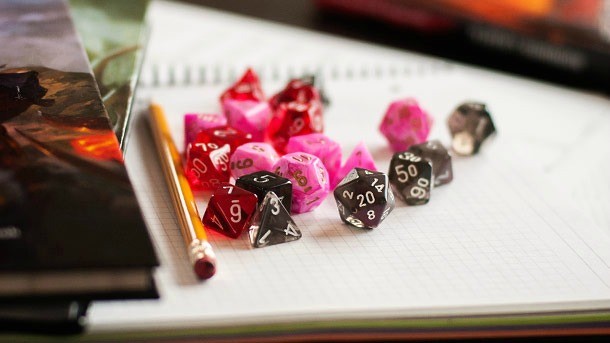
Each year, there are dozens of amazing tabletop games worth discovering, and it can be hard to know which titles might be a good fit for your gaming group. We're here to help, with a comprehensive look at some of the best board, card, miniature, and role-playing games that came to North America over the last twelve months. When you're ready for a break from the excellent selection of video games we're seen recently, any one of these tabletop games should lead be a great time for friends and family.
This year's selections include a mix of licensed and original worlds, and a surprisingly even mix of competitive and cooperative entries. 2015 saw phenomenal games for experienced strategy players, easy-to-learn games for casual friend get-togethers, and even a couple of titles that should be very friendly to beginning players.
Dive into the selections below, and make sure and leave your picks for the best tabletop games of 2015 in the comments below! Ten board and card games are listed on the first three pages in alphabetical order. A fourth page details a selection of five role-playing games worth discovering.
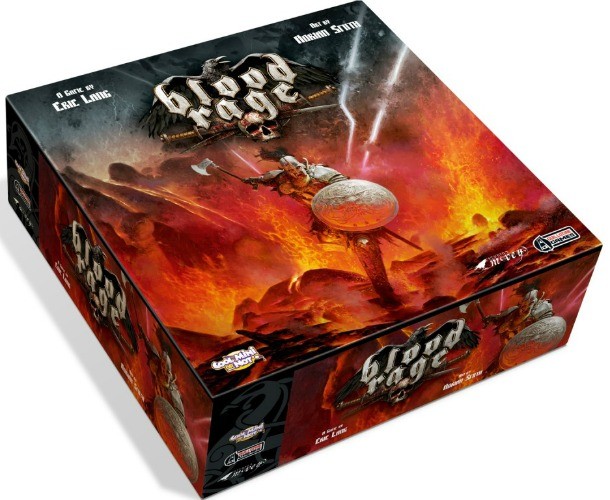
Blood Rage
Publisher: CoolMiniOrNot
Big, beautiful, and filled with compelling strategic choices, Blood Rage casts you in the role of Viking warriors in a battle for conquest in the midst of the end of the world – Ragnarok. The game focuses on area control and combat against your fellow players, each of whom has access to a gorgeous selection of miniatures, including some massive monsters that can help to turn the tide of the war. While Blood Rage is complex and features plenty of interesting choices, games can be played in relatively brief sessions. The themes of Viking conflict are abundant, with warriors that move on to Valhalla, and even different gods to follow, which helps to shape your strategy in any given night of gaming. Highly replayable, Blood Rage should satisfy any group trying to find this year's choice for classic map-based combat, but with some fun twists along the way.
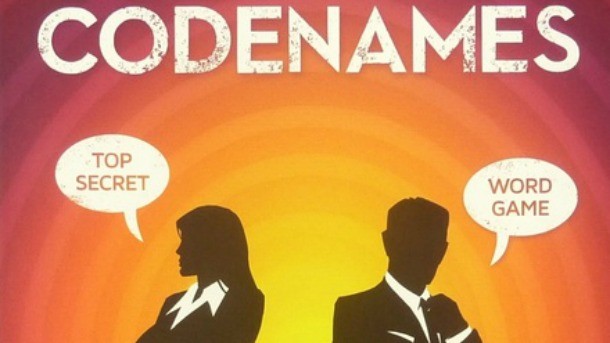
Codenames
Publisher: Czech Games Edition
Looking for a new party game that can appeal to a broad swath of player experience levels? Codenames is almost certainly on track to be the breakout group get-together game of the year, thanks to its clever design, simple rules, and strong theme. Two teams each choose a spymaster who knows the identities of 25 secret agents, represented by cards laid out on a grid on the table. The spymaster's goal is to communicate the identity of his or her team's secret agents, while everyone else on the team (the field operatives) are trying to figure out those identities. The two spymasters take turns offering a one-word clue that relates to some of the codenames on the table. The team tries to guess which names relate to that word. Succeed, and they get to go again. Fail, and play switches to the other team. The word-based play is intelligent and humorous, and the large number of cards makes Codenames enjoyable for session after session.

Darkness Comes Rattling
Publisher: Wyrd Games
Steeped in the feel of ancient mythologies from humanity's earliest days, Darkness Comes Rattling is a cooperative adventure board game that plays well for medium length game sessions, and provides clever gameplay and potent thematic elements. You and your friends control warriors drawn from the Tribes of Man, attempting to forestall the great serpent Darkness as it seeks to fully devour the sun. The game opens as you begin to prepare for your confrontation with the great serpent, but partway through your adventure, the strongest hero must enter the Darkness to do battle, while the other players hold off the shadow creatures that threaten success; this second phase injects tension for the latter half of the game session. Wyrd's new game provides storytelling in spades, injecting great descriptive text and a tribal aesthetic that is unique among recent releases. Game components, from the circular structure of the board to the colorful cards, are all gorgeous. Darkness Comes Rattling opens with the players already feeling like they face an insurmountable task, and gradually gets more difficult and devastating as you move along. Challenging, tense, and full of flavor, Darkness Comes Rattling is a great choice for experienced groups aiming for a change of pace.
Next Page: A supernatural sleuthing game, and a chance to save the world from an all-consuming pandemic

Mysterium
Publisher: Asmodee
Mysterium offers a fascinating twist on cooperative play, in which most of the players control psychics investigating a haunted manor, and one player controls a ghost, desperately trying to communicate the truth behind an untimely death. The Ghost player offers up vision cards to each of the psychics, and the team proceeds to debate and zero in on the specifics of the murder. The asymmetric gameplay encourages communication between players, and lots of fun discussions tend to ensue. If the team can figure out the culprit before the designated seven turns game turns (one night in the manor) are up, then everyone wins, including the ghost. Set in a decrepit old home in the 1920s, and chock full of spooky characters and events, you can think about Mysterium as a story-driven sleuthing experience several orders more exciting and advanced than the old classic, Clue.

Pandemic Legacy
Publisher: Z-Man Games
Many tabletop gamers are already familiar with the excellent cooperative game called Pandemic, in which a team of disease-fighting doctors and scientists seek to halt the spread of disease across the world. The new Pandemic Legacy is a sequel of sorts, built with an eye towards multiple play sessions, and evolving rules of play that are unique to each gaming group. Pandemic Legacy is played over a dozen or more play sessions, and is meant to be non-replayable after completing the full campaign. That's because each session changes the rules and components depending on how well your team is doing. Cards can be literally ripped up. Characters can die, and their abilities lost to the whole team for the rest of the campaign. Permanent stickers are placed on components or in the rulebook, changing the rules for subsequent sessions. Pandemic Legacy does a phenomenal job of reacting to the way you play, and making sure that each subsequent game night is balanced and engaging, no matter if you've been winning or losing. Whether you know the original game or not, this is the ideal way to experience Pandemic, presuming you have a consistent group that plans to return for multiple adventures and continue the unfolding plot.

Portal: The Uncooperative Cake Acquisition Game
Publisher: Cryptozoic Entertainment
Aperture Laboratories has once again started up testing, and you and your friends are on deck to confront the murderous traps and dangers along a conveyor belt of death. The competitive gameplay is simple but great fun, in part thanks to the evocative components, which include plastic cake slices, a loveable companion cube, and a polite but devastating laser turret. The game board has a scrolling mechanic, which sees game tiles slowly rotated out from one end of the conveyor belt as new tiles come in on the other side, often resulting in gruesome death for one or more of your test subjects. As soon as someone loses all their test subjects, the game ends, and the player with the most cake slices wins. While published by Cryptozoic, Portal touts that its development included numerous Valve employees. It shows, as the Portal board game does an admirable job of tapping the laughter and tone of the video game. This one is a lot of fun, but its humor may be a little bit lost on players who've never encountered the zany flavor of the original digital incarnation.
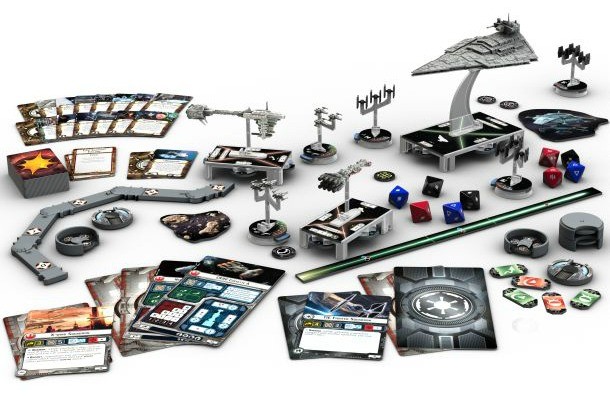
Star Wars: Armada
Publisher: Fantasy Flight Games
The highly expandable Armada may be just the thing if your Star Wars fever is currently at an all-time high. Riffing off the excellent formula established by the previous miniatures game, X-Wing, Armada takes the step up to the big leagues of ship combat, and tasks two players with command of capital vessels as they collide in massive strategic space duels. Opposing fleets move as ponderous but devastating machines of war – which is exactly how they should feel – while swarms of tiny fighter craft zip about the field of play. Armada does an excellent job of emulating the constant guesswork of two opposing commanders, each of whom is looking to outthink the enemy, as each player secretly selects where their ships will move in the upcoming turn. Be warned; the beautiful minis are highly collectible, so expanding your fleet can be an expensive proposition. But Armada does just what it should, providing a more complex and involved strategy experience than its cousin game, while still maintaining that inimitable Star Wars tone.
Next Page: Confront history in two dramatically different games, and hold off the alien menace in a shockingly good video game adaptation

Timeline Challenge
Publisher: Asmodee
The Timeline card games aren't great because they teach history. They're great because they make you forget you're learning since the game is so enjoyable. Timeline Challenge is compatible with the many diverse Timeline card packs that have released over the years, but this new board game adds several new twists to the formula. Players advance along a board by correctly guessing when particular events occurred in history, and each challenge offers a variation on the theme. Sometimes it's about knowing what era the event falls into, and sometimes it might even be guessing how far apart in history two disparate moments occurred. While Timeline Challenge is an excellent choice for families, the game is surprisingly fun even among adults who think they already know their history (most of us don’t, really). This board game version is exponentially more fun as you add in additional card packs, but the core game includes plenty to get you going.

T.I.M.E. Stories
Publisher: Space Cowboys/Asmodee
This time-hopping cooperative game sits in a hard-to-define space between board, card, and role-playing game, and that innovation is exactly what makes it so intriguing. You are agents of a futuristic corps that aims to resolve paradoxes in the time stream. In each scenario, you travel to different eras of history, attempting to resolve the mysteries that have warped the fabric of known time. In each era, in order to avoid further interrupting the timeline, you slip into the body of a host, and proceed to investigate the situation. A single run into the past is almost certainly not enough to resolve the problem, so you're often starting again, but with the knowledge and experience gained from your first attempt. Due to the freeform flow of T.I.M.E. Stories, the box is set up to allow you to "save your game" between sessions. Ideal for gaming groups who want an ongoing sci-fi story, and will be playing with the same players repeatedly, this one is a surprising twist on standard board game fare, and among the most innovative tabletop projects in recent memory.

XCOM: The Board Game
Publisher:Fantasy Flight Games
One of the best licensed games of recent years, XCOM takes the formula established by the excellent Firaxis video game and takes it in a whole new direction. Rather than emulating the squad level turn-based action of its digital counterpart, the entirely cooperative XCOM: The Board Game instead places each player in charge of one part of the anti-alien taskforce. The game's biggest innovation is the integration of a free digital app, which simultaneously streamlines the rules and acts as an in-fiction system for tracking the ongoing action. One player uses the app as a sort of communications officer with the rest of the players, while other players make decisions about how to combat emerging alien threats through careful deployments of troops, distribution of internationally donated funds, and even developing new technology. Gameplay is tense and frantic, as the literal and figurative timer clicks down on humanity's survival. XCOM: The Board Game is a benchmark to show how tabletop and digital design can work in tandem.
Next Page: The best role-playing games of 2015 include a chance to play yourself during the end of the world, or the chance to wield a lightsaber in a galaxy far, far away

The Best Tabletop RPGs of 2015
Cypher System Rulebook
Publisher: Monte Cook Games
It’s hard not to be a fan of Monte Cook's excellent dying earth-themed Numenera game from 2013, which was followed by the dimension-hopping fun of The Strange in 2014. The prolific game developer has now adapted the system to a more general setting, allowing gaming groups to determine their own setting and style of play. The full-color Cypher System Rulebook looks great and is an easy but lengthy read. It provides a complete set of rules for running Cypher games in any setting, and includes enough spells, equipment, and character descriptors to fuel a role-playing campaign of science fiction, fantasy, horror, history, or any other imaginable setup. The streamlined rules system makes for fast and narrative-driven gameplay, with a strong focus on player involvement and communal interaction across the group.

D&D: Sword Coast Adventurer's Guide
Publisher: Wizards of the Coast
Dungeons & Dragons has taken a different approach to rolling out published content with the 5th edition of the game, with a focus on organized play and shared adventures for the whole population of players. That's why many veteran fans may be excited to check out the Sword Coast Adventurer's Guide, which is reminiscent of the old campaign setting guides that were popularized in earlier editions. While focused on the Sword Coast region, the book is as much an update to the popular Forgotten Realms setting, with plenty of new character options, and a wealth of detail about the popular setting's places, gods, and historical events. For new players, be aware that this book isn't a standalone product – you'll need the three core D&D rulebooks to get started – but the Sword Coast Adventurer's Guide is an excellent base for any short or long term campaign.

The End of the World: Wrath of the Gods
Publisher: Fantasy Flight Games
Part of a series of role-playing games that each deals with a particular world-ending catastrophe, Wrath of the Gods puts players in the midst of a real world scenario that is suddenly confronted by the very unreal potential of ancient gods and supernatural beings rising to devastate the world. Instead of playing powerful wizards or superheroes, you create a character based on yourself, complete with statistics, strengths, and weaknesses that you designate about who you are. The game's setting is your hometown, and as supernatural events unfold around you, it's the everyday resources at your disposal that must be used to survive. Multiple scenarios are sketched out, so your group of friends can decide what catastrophe to confront. The Mayan Apocalypse might finally come to pass. Or Cthulhu could rise up out of the Pacific. You and your buddies get to (try to) live through both the end of the world, and what comes after. The game system is smart and quick to learn, and the character creation process is almost as fun as the unfolding narrative.
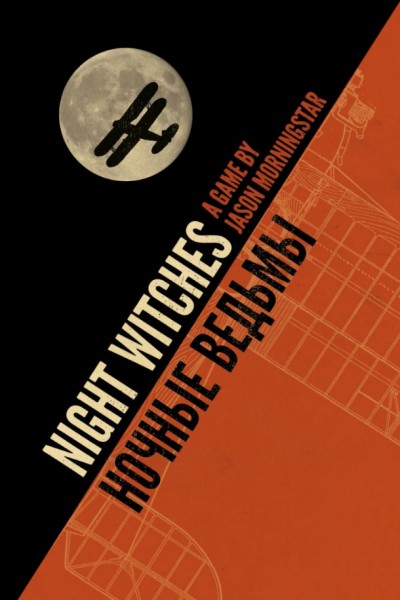
Night Witches
Publisher: Bully Pulpit Games
Easily one of the most intriguing and unusual RPG releases of the year, Night Witches is a historical game in which players control women who were part of an all-female Soviet air bomber regiment during World War II. These real-life pilots and navigators flew endless night missions behind German enemy lines in obsolete biplanes, while facing sexism and discrimination at home. In the game, players navigate the relationships and daily grind of life in the military, and then risk their lives in harrowing raids at night. Night Witches tackles issues of gender equality, homosexuality, and the brutalities of life in the wartime Soviet state. As such, it's a game for adults, but one with a captivating historical grounding. It helps that the game rules do such a remarkable job in communicating the themes and narrative. Single sessions can last just a couple of hours, or an entire campaign can track the regiment across the entirety of the war.
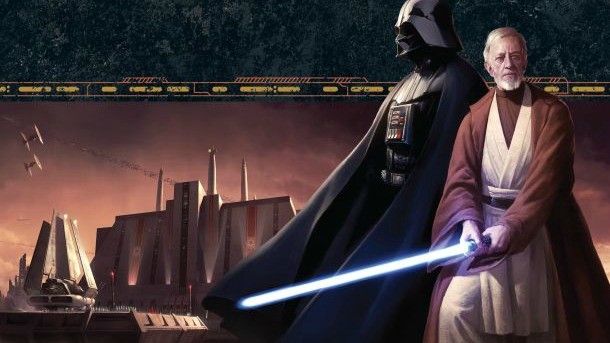
Star Wars: Force and Destiny
Publisher: Fantasy Flight Games
Fantasy Flight has been on a role with its approach to the Star Wars RPG license, with three games in as many years that explore different branches of the fiction. Previous entries explored the gritty underbelly of bounty hunters and smugglers, and then a second RPG flung players into the midst of the conflict between the Rebel Alliance and the Empire. But there's no doubt that many players were eager for this third entry, which puts players in the control of force-sensitive characters, complete with multiple styles of lightsaber combat, and a deep morality system that shapes your character along the light and dark side of the force. Along with the innovative dice mechanic at the core of all Fantasy Flight Star Wars RPGs, Force and Destiny is a great way for narrative-oriented gaming groups to get their fix.
What are your favorite tabletop games from 2015? What will you be playing with your friends and family in the coming months? Share your picks in the comments below, and thanks for reading!










